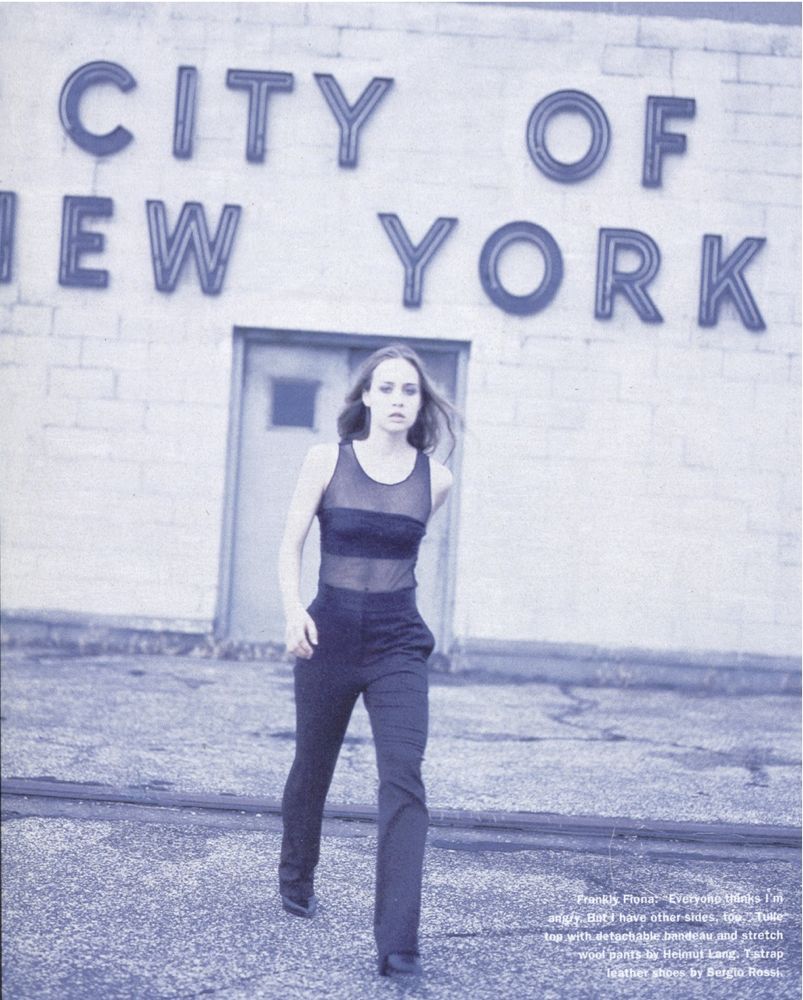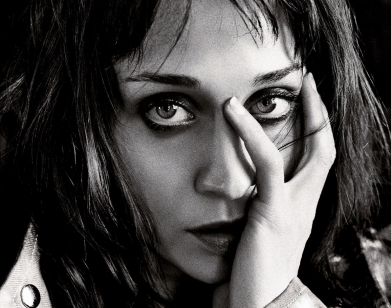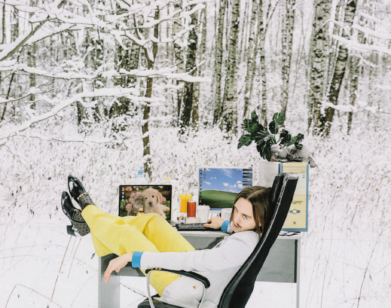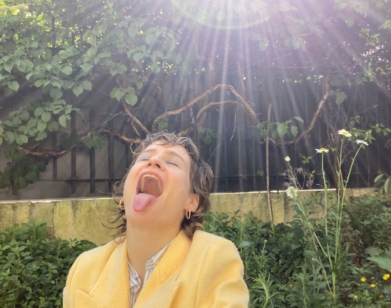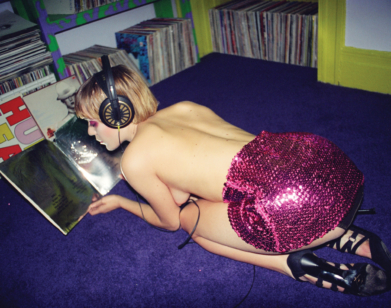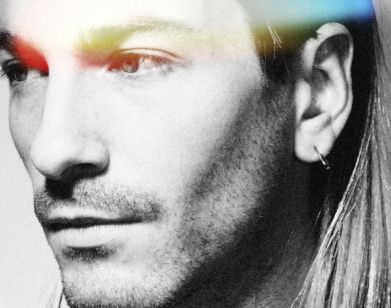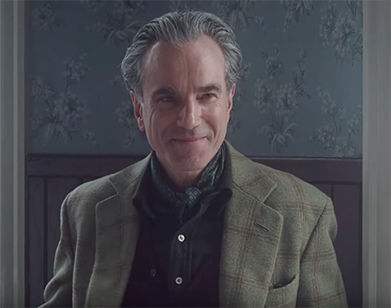New Again: Fiona Apple
Welcome back, Fiona! Returning to the main stage for the first time in five years, Apple, of the wide eyes and smoke-tinged vocals, kicked off her highly anticipated eight-day tour last Wednesday at South by Southwest. Apple’s first album since 2005’s Extraordinary Machine, the rather cumbersomely titled The Idler Wheel is wiser than the Driver of the Screw, and Whipping Cords will serve you more than Ropes will ever do, will be released in June. Apple did, however, debut a few tracks at SXSW, as well as playing her standards like “Sleep to Dream,” “Fast as You Can,” and the siren song of late-1990s teen angst, “Criminal.”
We last spoke with Apple in November 1997, shortly after her win of Best New Artist at the MTV Video Music Awards, where the 19-year-old singer-songwriter accepted her award with, “This world is bullshit!” In the interview, reprinted below, Tracey Pepper sits down with Apple on the eve of her 20th birthday, and the two discuss Apple’s ever-evolving relationship with body image and sexuality, and her crusade to be “the patron saint of reality.”
Fiona Apple
by Tracey Pepper
Since the arrival of Tidal (Work/Clean Slate), Apple’s platinum-selling 1996 debut, she has blossomed into a full-fledged celebrity. She’s become as well known for her outspoken tantrums as for the sophisticated world-weary quality of her music. Everything she does seems to get people talking: the crying jags during photo sessions; the kiddie-porn overtones of her striking “Criminal” video; and in September, her jarring acceptance speech for Best New Artist at the MTV Video Music Awards.
But the truth is that Apple isn’t much different from any other smart, emphatic, self-aware young woman undergoing a search for her identity; she just happens to be doing it in front of millions of people. (Some of the material on Tidal Apple composed when she was 15 after having been raped by an intruder in her Manhattan apartment building.) Write her off as a self-absorbed psychobabling adolescent, or embrace her as refreshingly honest—it’s hard to deny that she knows her own mind. Speaking to Apple by phone on the day before her 20th birthday, I found her intelligent, thoughtful, and above all, funny.
———
TRACEY PEPPER: You’ve had an amazing year, achieving a level of success that most artists only dream of. But in many of your public appearances, you come off as unbelievably angry. What are you so upset about?
FIONA APPLE: My whole life, people have been saying, “Why are you so angry?” and I didn’t know what the hell they were talking about. After I saw myself at the MTV Awards, I realized, Wow, I do kind of come off a bit intense. [laughs] I wasn’t upset at MTV at all—I didn’t mean to come off that way. But I think it’s good if I appeared a bit angry. People are too complacent.
PEPPER: So you’re saying you’re not angry?
APPLE: I think I did a wonderful thing. I have absolutely no regrets. I’ve gotten a lot of shit for the things I said when I got my award. Some people say I made an ass out of myself. But I had an opportunity, and I took it the way I wanted to. The people I was talking to understood what I was saying.
PEPPER: But there’s no denying that a lot of people you’re talking to react very negatively to your attitude. Doesn’t that, on a certain level, make you wrong?
APPLE: No. I really don’t think anything I do is a mistake. It could be if I didn’t learn from it. But in the long run, no matter what I do for the rest of my life, I’ll know I did something wonderful by saying what I felt. That’s what I said up there: “Go with yourself.” And that’s what I did.
PEPPER: Now that you’re so heavily scrutinized, do you ever feel like you have to rein yourself in so that people won’t be so critical?
APPLE: I feel that way, but at this point it’s my duty not to crumble and close off. I’ve gotten this far because of my willingness to make myself vulnerable.
PEPPER: But there are people who live to take advantage of that—especially the press.
APPLE: What can they do to me? I don’t need the press to validate me. I almost feel like it’s my duty to make an ass out of myself in public. Just to prove that you can take risks—that you can’t fuck up. No matter what I do, everything is going to work out.
PEPPER: And judging by the pop charts, a lot of people seem to like you.
APPLE: Yeah! They’re still buying the record!
PEPPER: What bugs you most about being famous?
APPLE: These days I don’t know who really likes me. I always assume most people are bullshitting me.
PEPPER: Are you talking about your friends?
APPLE: Friends, people I’ve known for a long time. Weird things will happen that end up hurting your feelings. I’ll get a letter from somebody I knew a while ago and I’ll be really touched. Then I’ll turn over the envelope and their business card falls out.
PEPPER: Growing up, you were never confident about your singing ability. Now that you’ve sold more than a million albums, does it ever occur to you that you might have been mistaken?
APPLE: Yeah. See, I never went to concerts when I was a kid, so I never knew if what I was doing onstage was right—and this was true of everything I did. I was so self-critical. I still am, but it’s not as bad anymore.
PEPPER: Let’s talk about your video for “Criminal,” which I think is what’s propelling you up the charts. I was surprised when I saw it, because you’ve said you don’t feel comfortable presenting your sexuality, and yet there you are, stripping and cavorting in your underwear.
APPLE: When Mark Romanek showed me his treatment, I called Andy [Slate, Apple’s manager] and said, “This is Fiona taking her clothes off in the kitchen, Fiona lying by the pool naked; Fiona in underwear, naked.” Then I called Mark and we talked about his idea that the song is about guilty pleasures and sexual deviance—me being in this house full of people, going around and experimenting, feeling a little bad about it, but enjoying it all the same. It corresponded with my meaning of the song.
Making the video was a huge step for me, personally, because I’m not comfortable doing any of that. When we were shooting, there were all these female extras who are paid to be pretty. They tried to make me pretty, but that’s not what I do: I am paid to sing and perform. So I’m there, as insecure as ever, surrounded by all these dancer-models strutting around in bikinis. I had a stand-in and she was gorgeous. I was dying.
I’ve gone through stages where I hate my body so much that I won’t even wear shorts and a bra in my house because if I pass a mirror that’s the end of my day. So it was a personal mission to do that video. To get up in front of all those gorgeous girls and strut my stuff. To convince myself, You’ve got something else going on here. It was a huge step. But in the end, the truth is it’s fun to be up there and know that you’re in your underwear. Even though I know I’m exploiting my sexuality in a certain way, it’s fun! It boosts my ego. Which is exactly what the song is about.
PEPPER: OK. You’ve turned that corner. But your live performances still make it seem as if you have an ambiguous relationship with your sexuality.
APPLE: Well, that’s a bit for difficult. Last night, right before I sang “Sullen Girl”—a song about being taken advantage of sexually—this man in the audience started yelling, “Take off your pants!” It was hard for me to go on with the show after that. Everyone thinks I’m angry? You have no idea! He waited all this time to see me play, and now all he wants is for me to take my pants off? There I was in my little midriff shirt and jeans, and I thought, Oh, I am showing myself—no wonder. But that’s what’s really fucked up. If women want to be appreciated for what we’re saying, we’ve got to wear turtlenecks and long pants.
PEPPER: It seems like you’re contradicting yourself. How can you have it both ways?
APPLE: I’ve figured out a way of manipulating it for my own good. I never thought I’d be in a position where people would be talking about my sexuality and saying how good I look in underwear. It’s a little uncomfortable. But I figure if I am in that position, then it’s my responsibility to set my own standards. People underestimate how important and powerful the media is for young people who grow up watching a lot of television. Through the media, we’ve establishes this standard of what every human being should look up to: somebody who always looks right; who always has the right light on their face; never has bags under their eyes; never says anything inappropriate. Somebody who always somehow turns out perfect. I hate the fact that celebrities are supposedly a higher class of human being. That’s the way I felt growing up, and that’s the way I think a lot of people feel. So now that I’m in this position, I want to change things. I want to be like the patron saint of reality.
PEPPER: There are people a lot older than you who still haven’t figured that stuff out.
APPLE: You know, the age thing really bugs me. Do people have more of a right to not like what I say because I’m 19? I’m up here because of what I write. Obviously, I must know something, or I wouldn’t have been nominated for Best New Artist. Sometimes it’s like, “You’re right. My mother wrote these songs.”
PEPPER: You know, that brings up another point: You’re funny! It’s too bad people don’t see your sense of humor.
APPLE: My dad was telling me that everybody sees me as this sullen and insecure little thing. Those are just the sides of me that I feel it’s necessary to show because no one else seems to be showing them. But I have other sides, too.
PEPPER: I see your point, but do you really want to be the poster child for teen angst?
APPLE: There are lots of poster children for angst. But there aren’t many poster children for cool angst. Everybody thinks it’s cool if you’re the bad girl. But what about the people who are really not feeling that great? Why can’t I get up in front of millions of people, as a person who represents my generation, and tell them that I’m angry? Who puts these limits on what my personality should be in public? A few days ago, I was on The Howard Stern Show talking about the MTV award. Howard was telling me what’s inappropriate to say in public! Maybe I should’ve just lowered myself down in a Fart-Man uniform. That would have been appropriate.
PEPPER: But there’s a subtlety I think you’re missing. Maybe your openness would serve you better if you reserved it for people you trust. Maybe you should protect yourself a little.
APPLE: I’ll be fine.
PEPPER: But as you get older, you may realize you don’t have to share every though that flickers across your brain.
APPLE: I just don’t feel that way. I resent limitations. I’m going to be this way for a while, and then the funny side of me is going to come out. Slowly, people are going to realize they’re seeing a completely honest evolution of human life.
PEPPER: What’s your next album going to be about?
APPLE: I’ve already decided that it’ll be called Corrupt.
PEPPER: That won’t do much to dispel people’s notion of you as the sullen girl with the overactive bullshit detector.
APPLE: [laughs] Yeah, I know.
PEPPER: Do you think that being raped at age 12 has made you more adamant about being open and vulnerable? It seems odd you chose a career that puts you out there in the public eye. I mean, the guy who raped you is still free.
APPLE: For a while after the rape, I was really afraid of my own sexuality, because I got raped right about the time when I started developing physically. So I started to think that a woman’s body was her curse, that it was just the bait that attracted all these sharks. I had no sexuality about me. Now I’m getting back to where I was. Then when that guy said, “Take off your pants!” it almost knocked me over inside. It’s weird. I don’t know why I’m doing this. Rape is the most humiliating thing that can be done to you; it’s the most vulnerable that you can be. But once I realized that, I became a stronger person and faced all my fears. Now it’s like, Well, the worst has happened and I’m fine. Now I feel like whatever I can do, no one can hurt me. I cannot be violated, I cannot be humiliated, I cannot be disregarded. I cannot be disrespected. I respect myself and believe in what I’m doing, no one can touch me.
THIS INTERVIEW FIRST APPEARED IN THE NOVEMBER 1997 ISSUE OF INTERVIEW.

